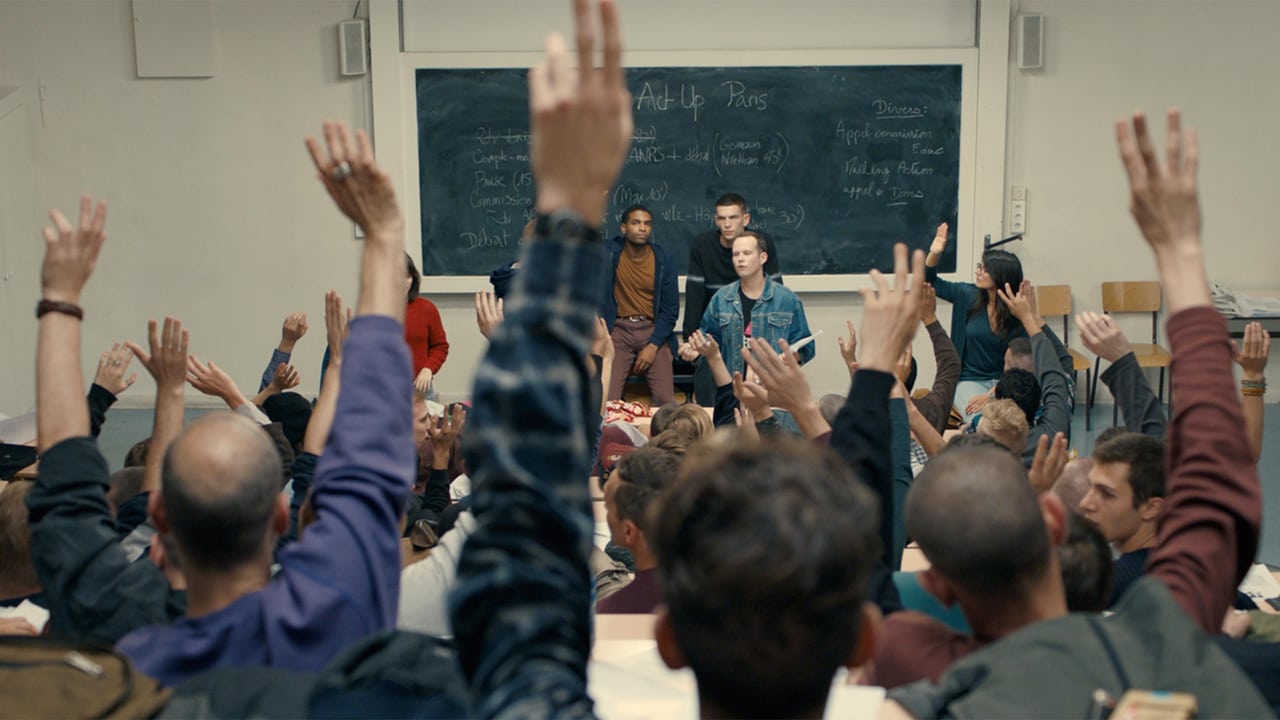

First premiered at Cannes where it won a Grand Prix, it's an impotant story of AIDS epidemic throughout the 90s in Paris and the actions taken by ACT UP organization founded to fight the epidemics.This film does a great job at showing the activism at its thriving and not so thriving stages and introducing us to the stories of people until, at some point, a romance takes place while movie doesn't loose its quality and starts balancing two narratives.Great casting, directing, sound choices. I will be happy to see two main actors in many new films waiting to see the light of day. They are proven talented and capable of taking demanding roles like ones showed here.I noticed some unusual and smart ways of using sex scenes to deepen the background of the story, the story of one, also the one of the many.Techo music was the music of the epidemic, 120 beats per minute, but at some point, heartbeat dismiss the techno and takes over, while the blood river flows though the city of Paris.
... View More"120 battements par minute" or "120 Beats Per Minute" or "BPM (Beats Per Minute)" is a new French 2017 movie that runs for a massive 2 hours and 20 minutes. This one was written and directed by Moroccan filmmaker Robin Campillo and it may be his biggest success so far looking at the movie's awards recognition. It is also France's official Oscar submission and we will see how far it gets there. The subject sure deserves to make an impact as this is about the group ACT UP in France over 2 decades ago who were fighting for a better life for H.I.V. patients at that time and opposing those standing in its way like political institutions struggling to inform students properly on the subject of sex education or medical companies most of all, who put their financial interest over those suffering from this horrible illness. I personally think that this is a subject that really deserves the attention and also one that has not got it yet to the extent it should. Normally you find H.I.V. plots and references only in side stories in films. It's good this one was made. It is important. The cast includes mostly up-and-coming young actors that I as a German audience member must say I did not know before watching this one. Maybe Frenchies will know them. The one exception here would be Adele Haenel, who also probably gave my favorite female performance. As for the males, I quite liked Reinartz and of course Nahuel Pérez Biscayart, who eventually probably turns into the movie's MVP, something I did not expect early on. Admittedly, he also has great material, but he also made the most of it.Impressively, the film never really drags despite running for almost 150 minutes, at least not to me. I personally enjoyed the moments involving the group (also the introduction to the group early on during which the camera basically treats us like an actually new member, very well done) more than those focusing on the members' individual lives, like especially the love relationship between the new member and old member, but this also got a lot more interesting the longer it went when things take a turn for the worse sadly. And eventually, there is this coming together between the group element and the individual member element and I quite liked that too. The most powerful moment was probably the graveyard reenactment with the crosses, I'm sure ou know what I mean, that was truly touching. Another thing I liked was that they did not show the group as a mass of everybody thinking the same and agreeing on everything with each other. Discussion and conflict were vital in making the right decisions and moving closer to finding common goals and reaching them. Watching this show will in fact make you want to be a part of this movement and wants you to join the group in one way or the other as they all seemed friends sticking together closely, even if their opinions may differ frequently. As for the very ending, we got the evidence that a life may have been lost, but the movement only gets stronger and everybody sticks even closer together with each other. Plus the way they went from loud to completely silent the moment the credits roll in was a smart decision as the film offers really a lot to think about.Honestly, I must say I am not too sure if the Oscars will go for this one here due to the subject and running time, but I will cheer for them for sure and would be happy to see them nominated. The win is a long shot though with Sweden perhaps being in the best spot at this point. But at least 120 BPM did not go comnpletely overlooked this season. It is one of the best 10, maybe even 5, films I have seen all year and I highly recommend checking it out. Combining the general movement with individual stories may certainly have been a good decision here and the execution is close to flawless also in terms of the technical production values. These also added to this being an unapologetically bold, radical movie full of energy, full of emotion and full of grief. But most of all full of progress about a group that shaped the way for generations to come. H.I.V. may not be one of the most controversial topics in the western world these days, but we should not take that for granted and thank those who were blazing the trail. So get a good set of subtitles (unless you are fluent in French) and watch this one on the next occasion you get. Highly highly recommended, it's rare to see a touching political movie these days, but this really works so well from start to finish in that department that you really don't want to miss out. No excuses. See it.
... View MoreA story with a particular historical moment in mind has been rendered timeless. A random first generation Gameboy generates a temporal whiplash, as the film's events are portrayed as contemporary catastrophes. Silence equates to death, and the team meeting in a college lecture hall has dwindling numbers, yet deafening shouts.A prejudicial plague scorches France, bringing an already tight-knit community into a blood brotherhood. ACT UP is a guerrilla group full of eventual corpses. The HIV epidemic has threatened their love and survival. Pharmaceutical companies have cubical indifference as antidotes are sluggishly distributed by financial logistics. As the non-violent vigilantes face just as many internal conflicts as press-generated woes, their operations grow in scale and creativity. Their weekly conferences have an intentional cadence complete with respectful snaps, hisses, and hand signals designed to facilitate the mutual understanding that has gone extinct beyond the university walls.Sean is one of he founding members, and has some of the worst test results. He is the loudest in any given demonstration, and celebrates harder than all his peers. ACT UP is Sean's final lifeline, and his involvement resounds as a funeral dirge among a thunderous parade.Campillo has delivered another dialogue driven barrage of human desperation. The sprinkling of establishing shots offer a reprieve from the claustrophobic disputes between the positives and the businessmen impartial to death. An important angle to an understated tragedy that shaped legislation in the most vital ways.
... View More(120) Beats per minute is a great french movie which deals with the AIDS epidemic, set in France in 90s. A must-see film. I think probably one of the best movie of the year. Awards : "Grand prix" and Queer palm of Cannes film festival 2017. So, talk about it with your (girs/boy)friend(s),parents and even pets. Enjoy this movie ; )
... View More